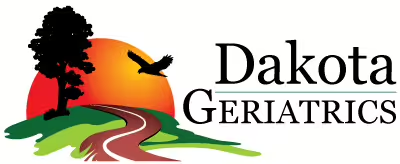Ongoing Education
Dakota Geriatrics presents educational videos addressing the age-friendly framework from recorded healthcare professional learning opportunities.
Age-Friendly Health Systems adopts the concept of applying a set of four evidence-based frameworks of high-quality care, known as the “4Ms,” to all older adults in the healthcare system. Age-Friendly Health Systems is an initiative of the John A. Hartford Foundation and the Institute for Healthcare Improvement in partnership with the American Hospital Association and the Catholic Health Association of the United States.
For more resources, see our Age-Friendly Microlearning.
What Matters
Know and align care with each older adult’s specific health outcome goals and care preferences including, but not limited to, end-of-life care and across settings of care.
Medication
If medication is necessary, use Age-Friendly medication that does not interfere with What Matters to the older adult, Mobility or Mentation across setting of care.
Mentation
Prevent, identify, treat, and manage dementia, depression, and delirium across setting of care.
Mobility
Ensure that older adults move safely every day in order to maintain function and do What Matters.
Age-Friendly Health Systems
Dakota Geriatrics works with primary care clinics to implement Age-Friendly Health Systems throughout the states of North Dakota and South Dakota. Age-Friendly Health Systems is an initiative of The John A. Hartford Foundation and the Institute for Healthcare Improvement (IHI) to adapt evidence-based practices and align What Matters to the older adult and their family caregivers at every care interaction.

Key
Applicant: A health system is developing a plan to adopt 4Ms framework into practice.
Level 1: An Age-Friendly Health System Participant is recognized for being on the journey to becoming an Age-Friendly Health System and has submitted a description of how it is working towards putting the 4Ms into practice.
Level 2: Age-Friendly Health System – Committed to Care Excellence is a recognition for being an exemplar in the movement based on 4Ms work is aligned with the Guide AND at least three months’ count of older adults reached with evidenced-based, 4M care.
Applicant:
- Sunset Drive
Mandan
Level 1:
- Home Therapy Solutions
Grand Forks - Indian Health Service – Quentin N. Burdick Memorial Healthcare
Belcourt - Indian Health Service – Standing Rock Service Unit
Fort Yates - Innovative Therapy Solutions & Consulting LLC
- Sakakawea Medical Center – Coal Country Community Health Center
Beulah • Center • Hazen • Killdeer - Sakakawea Medical Center – Hospital
Hazen - Sakakawea Medical Center – Knife River Care Center – Long Term Care
Beulah - Sakakawea Medical Center – Senior Suites at Sakakawea Medical Center
Hazen - University of North Dakota-Center for Family Medicine
Minot
Level 2:












